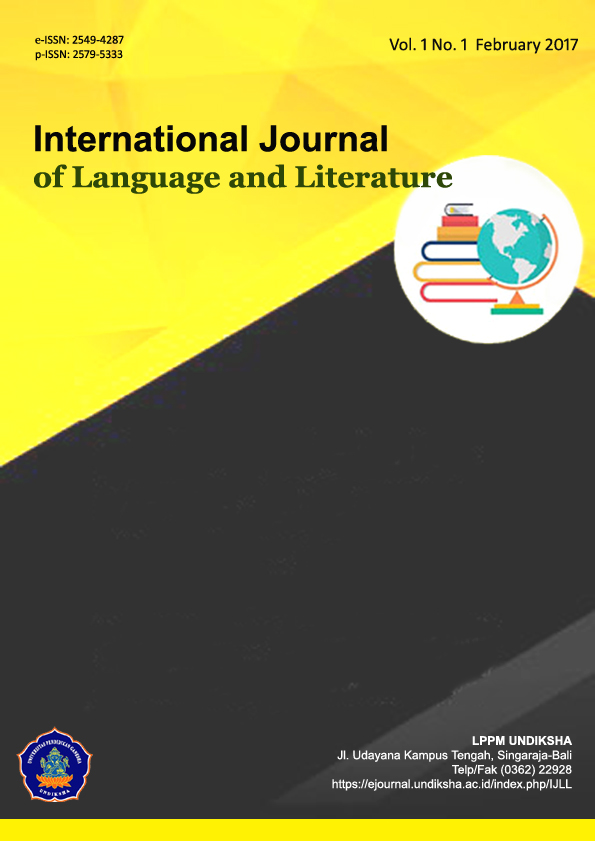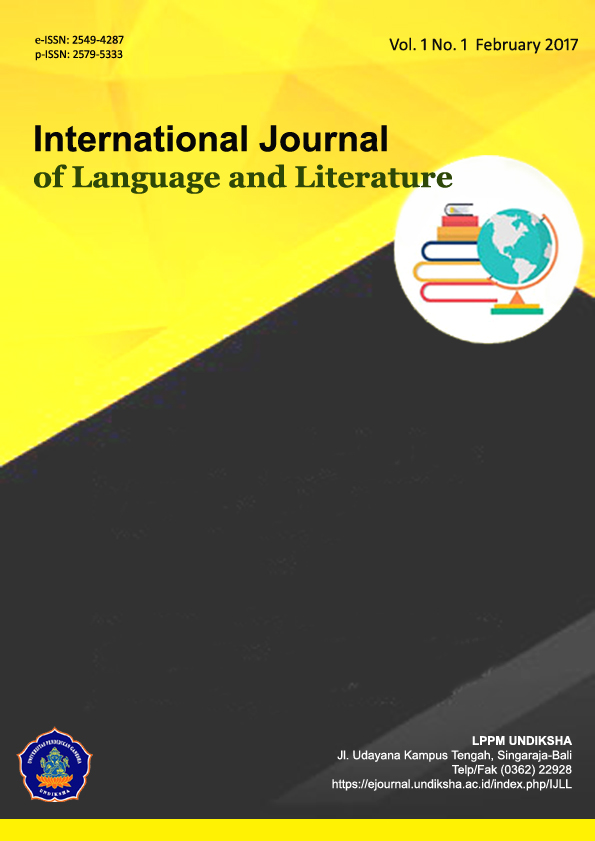THE EFFECT OF DICTOGLOSS STRATEGY ON THE LISTENING COMPETENCY OF THE TENTH GRADE STUDENTS AT SMA NEGERI 1 SUKASADA IN ACADEMIC YEAR 2016/2017
DOI:
https://doi.org/10.23887/ijll.v1i1.9621Keywords:
Listening competency, Dictogloss, ConventionalAbstract
This study aimed at investigating whether or not there was any significant effect on students’ listening competency who were taught by dictogloss strategy and those who were taught by conventional strategy. The population of this study was the tenth grade students in SMA N 1 Sukasada. Two classes were taken as samples in this study using cluster random sampling technique. They were assigned as experimental group and control group by lottery. To obtain the required data, the two groups were given different treatments. The experimental group was taught by using dictogloss strategy, meanwhile the control group was taught by using conventional strategy (cloze listening strategy). To collect the data the instruments used in this study were the teaching scenario and post-test in the form of listening test. The obtained data were then analyzed descriptively and inferentially. The result of inferential statistics showed that the t-observed exceeded the t-critical value. Thus, the null hypothesis was rejected, which means there was significant effect on students’ listening competency who were taught by dictogloss strategy and those who were taught by conventional strategy.
References
Anwar. (2013). Improving Students’ Listening Comprehension of SMA Negeri 2 Luwuk Through Adapting Dictogloss. E-JurnalBahasantodea, 1(1).
Bidabadi, F. &Yamat, H. (2011). The Relationship between Listening Strategies Used by Iranian EFL Freshman University Students and Their Listening Proficiency Levels. English Language Teaching, 4(1). http://dx.doi.org/10.5539/elt.v4n1p26
Bozorgian, H. (2012). Listening Skill Requires a Further Look into Second/Foreign Language Learning. ISRN Education, 2012, 1-10. http://dx.doi.org/10.5402/2012/810129
Ciptaputri, I. D. (2014). The Use of Dictogloss Strategy to Improve Students’ Listening Comprehension. Unpublished. State Institute of Islamic Studies Salatiga.
Cross, D. & James, C. (1994). A practical handbook of language teaching. New York [u.a.]: Prentice Hall.
Hattingh, S. (2014). The Importance of Teaching Listening. Unpublished. Osaka International University.
Lindstromberg, S., Eyckmans, J., &Connabeer, R. (2016). A modified dictogloss for helping learners remember L2 academic English formulaic sequences for use in later writing. English For Specific Purposes, 41, 12-21. http://dx.doi.org/10.1016/j.esp.2015.08.002
Nation, I. & Newton, J. (2009). Teaching ESL/EFL listening and speaking. New York: Routledge.
Paris, C. (2016). The Importance of Listening, and Ways to Improve Your Own Skills. Udemy Blog. Retrieved 8 February 2016, from https://blog.udemy.com/importance-of-listening/
Prince, P. (2013). Listening, remembering, writing: Exploring the dictogloss task. Language Teaching Research, 17(4), 486-500. http://dx.doi.org/10.1177/1362168813494123
Wajnryb, R. (1990). Grammar dictation. Oxford: Oxford University Press.
Wolvin, A. (2012). Listening, Understanding, and Misunderstanding. Unpublished. Universidad Nacional Federico Villareal.
Downloads
Published
How to Cite
Issue
Section
License
IJLL Journal provides immediate open access to its content on the principle that making research freely available to the public to supports a greater global exchange of knowledge.

This work is licensed under a Creative Commons Attribution-ShareAlike 4.0 International License








